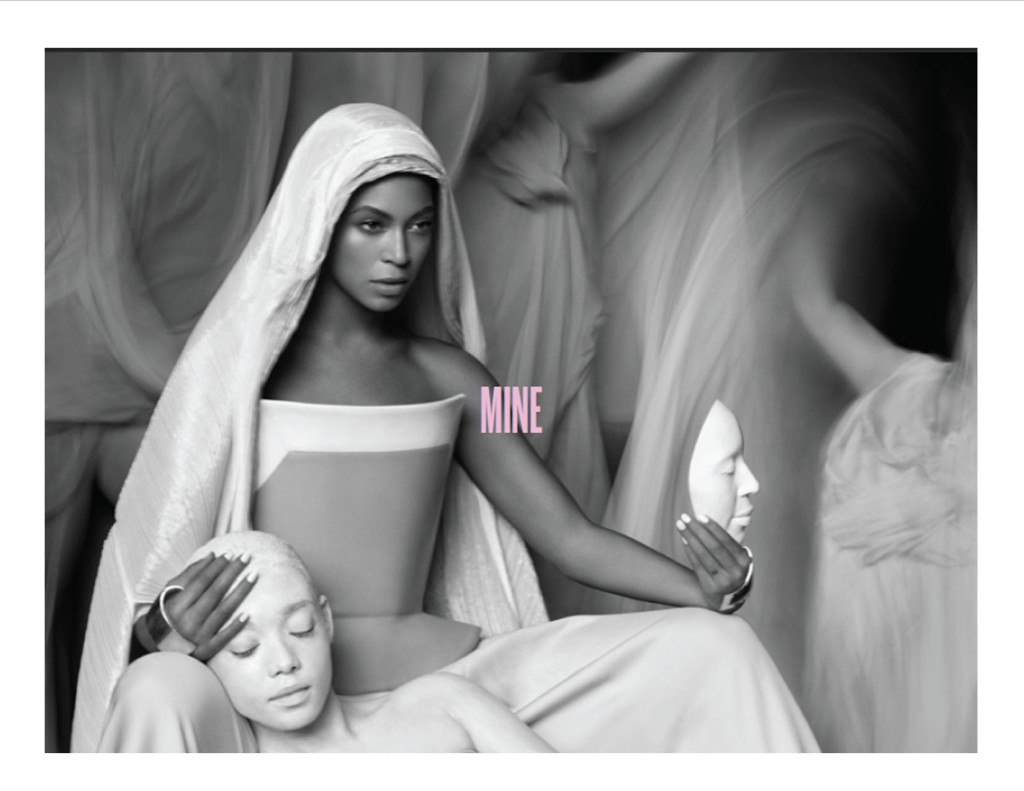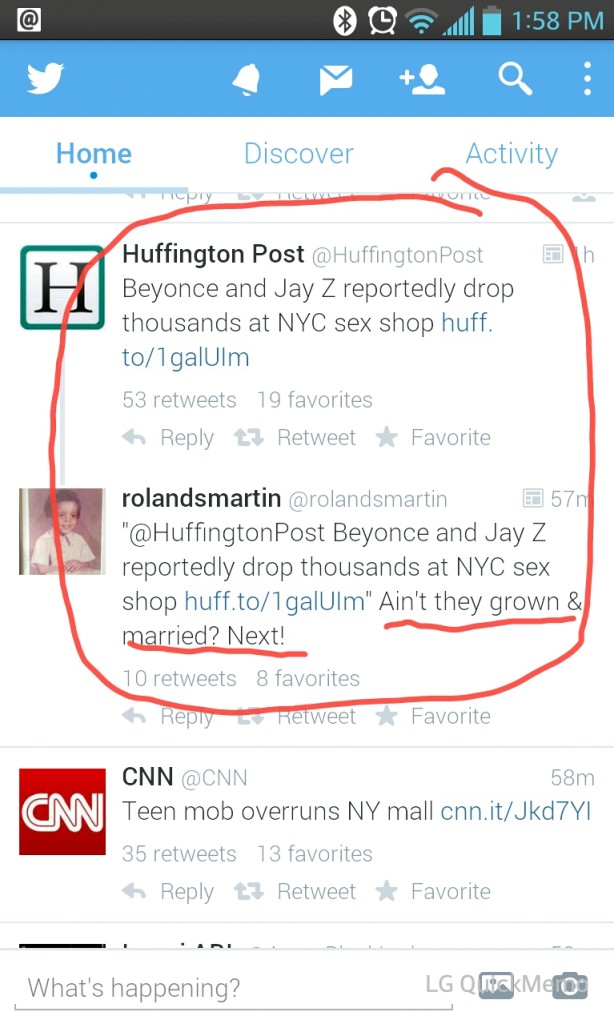Originally published Dec. 27, 2013

A still from the video “Mine,” included in the digital booklet that came with Beyonce, the album. What does the image reference? Click here.
I said I wouldn’t write about this because I knew I wouldn’t download the album until after Christmas and my commentary would be late and go largely unnoticed, and what more could I add to all that’s already been said anyway? But I downloaded Beyoncé on Christmas Eve, and after listening to every song, watching every video, looking up some lyrics and recalling the commentary I read earlier this month, I decided to blog my thoughts because I’m a little befuddled.
The Twitter conversations went on for days. The talk of this new, raunchy Bey who unabashedly accepts and expresses her sexuality had black women all the way turnt up. The underlay of Chimamanda Adichie’s TEDx Talk, “We Should All Be Feminists,” beneath “Flawless” had black women taking selfies first thing in the morning. Sure there were a few black women who were brave enough to critique Beyoncé’s feminism for its lack of intersectionality, but the backlash was immediate and hostile. The defense of Beyoncé—the woman, the entertainer and the album of the same name—as feminist was so fervent, you would have thought black women were defending their own mamas in a game of The Dozens that got out of hand.
All of which is why I expected to hear Beyoncé for the first time and then—I don’t know—run outside topless while shouting, “I am woman!” or have my back completely and miraculously healed so I can twerk and hang upside down off of poles and learn to rollerskate; or feel empowered to just free myself sexually with a one-night stand (as significant other is nonexistent over here); or take an Erotic Black Woman Power selfie: one fist raised in Black Power, the other hand busy masturbating—don’t know how I’d take the picture—as my face immitating Yonce’s in “Blow” or “Rocket.” (Just to be clear, I’m kidding.)
I expected to feel flawless and to feel like Bey is my sister in the struggle. But Beyoncé hasn’t had that effect on me. Maybe it’s because Beyoncé’s ass—a body part she seems to be quite proud of—is too perfectly round and black womanish for me to feel confident about mine. Maybe it’s because a gorgeous woman and mother with defined ab muscles and with thighs that don’t rub together comes off a little disigenuous when singing about all the damage done to women by unrealistic standards of beauty. Maybe it’s Jay Z’s reference to Ike Turner and the fact that of all the songs that could have been chosen, that one with that homage to domestic violence, is the one being played on popular radio now. It might be because I, like Real Colored Girls, want a feminism that goes against capitalism, and I saw where Beyoncé had a promo event at Wal-Mart and bought her own CD and $37,000 in Wal-Mart gift cards for joyous customers.
Actually, none of that is the thing that makes me reject Beyoncé as Feminist Album of the Year. It’s something I haven’t seen or heard any blogger talk about yet: her status as a married woman. I remember seeing a tweet about someone at Slate being mad that Beyonce is heterosexual and doesn’t acknowledge the LGBTQIA (aside: I think seven letters to an acronym that doesn’t spell anything is outrageous) community in her body of work, but this isn’t the same argument. While I agree with defenders of justice who say Beyoncé is a feminist (more on that later), I’m having trouble understanding how Beyoncé produced such staunch defenders of her feminism because all this sexual freedom motivating her defenders takes place within the confines of marriage.
I know: hating men and/or marriage is not a requirement of feminism, and you are not required to view marriage as a patriarchal institution in order to be a feminist. True. But if you’re a feminist who’s also churched you are required to view marriage as the only valid, God-approved place for sexual freedom. Beyonce is married. While it somehow got into popular, sexist thinking that women aren’t supposed to like sex even in marriage, the church teaches something quite different. Church teaching says “Song of Solomon” is a celebration of the erotic between man and wife. (Except when you don’t want people to belive that, in which case Song of Solomon is about Jesus and his bride, the church, and all that talk about oral sex in the garden and no reference at all to procreation is just symbolic.) Evangelical purity culture promises mind-blowing sex—if only you wait. I’ve heard preachers—in the pulpit—remind congregants that Adam and Eve “knocked boots” and give the go-ahead to married couples to “swing from the chandeliers.” (Just to be clear: those are direct quotes. I’m not kidding.) You could say that the preachers were only talking to the men, but when you consider that most people attending church are women, that doesn’t make sense. And if swinging from the chandeliers is church-approved, it must be okay for married folks to have sex in the limo on the way to the club, too.
(And it’s also cool with God to record songs about sexual pleasure that sound a lot like gospel songs. A lot.)
In other words, as a Christian who’s also a feminist, I can’t say Beyoncé is doing anything revolutionary by getting hers when she’s with her husband. As a black woman and stickler for intersectionality, I’m supposed to see a married black woman enjoying her body, her sexuality, and all kinds of sex with the partner of her choice as the biggest step toward black women’s liberation since Shirley Chisolm’s presidential run. While I want to acknowledge and honor those observations, I borrow from Barbara Smith and Sonia Sanchez to ask, “How do it free us?” How do it free us single, sexual black ladies who get hammered from the pulpit? Who have promising relationships end because of sexual inhibitions? Who feel like they have to choose between sexuality and spirituality? Who are Jezebels to the secular and religious communities?
Not that any of that should be Beyoncé’s concern. I think she’s a feminist because she’s all but said so in several interviews and songs. She’s a capitalist feminist, but so is Sheryl Sandberg. I see Beyoncé’s feminism as very much steeped in Western fights for women to have autonomy over their money and their bodies. That might be a very basic way to think about feminism, but Beyoncé is still a feminst. As I said in a Facebook comment when someone posted the lovingly honest piece, “The Problem with Beyhive Bottom Bitch Feminism,” I don’t think anyone who has critiqued Bey is holding her to a high standard of intersectional feminism as much as they are holding US—black feminists and black intellectuals, especially those who use social media as their platform—accountable for looking at feminism in a way that’s too simplistic. When you want to be supportive of black women and the free expression of their sexuality (Bey) and their right to be moms (Michelle Obama), it becomes easy to give them a pass on everything else (and to ignore decades of feminist and black feminist scholarship in the process) in favor of however we can support black women at the moment.
I don’t think it’s okay to do this, so I haven’t. (Also not okay for a feminist from Texas to say nothing on her “feminist” album about how Texas treats women.) I’ll ask black feminists, womanists, intellectuals, and those whose actions demonstrate who they are without labels to look out for one another without over-simplifying the issues. And I’ll look for Mrs. Carter to entertain me, not free me.
P.S. – I love the album.


Recent Comments